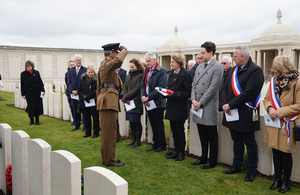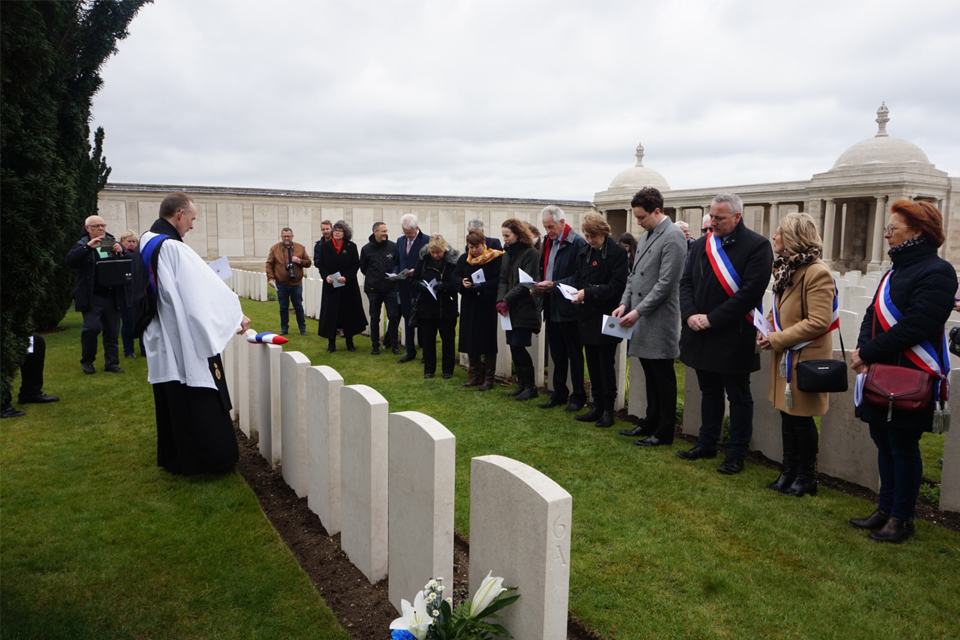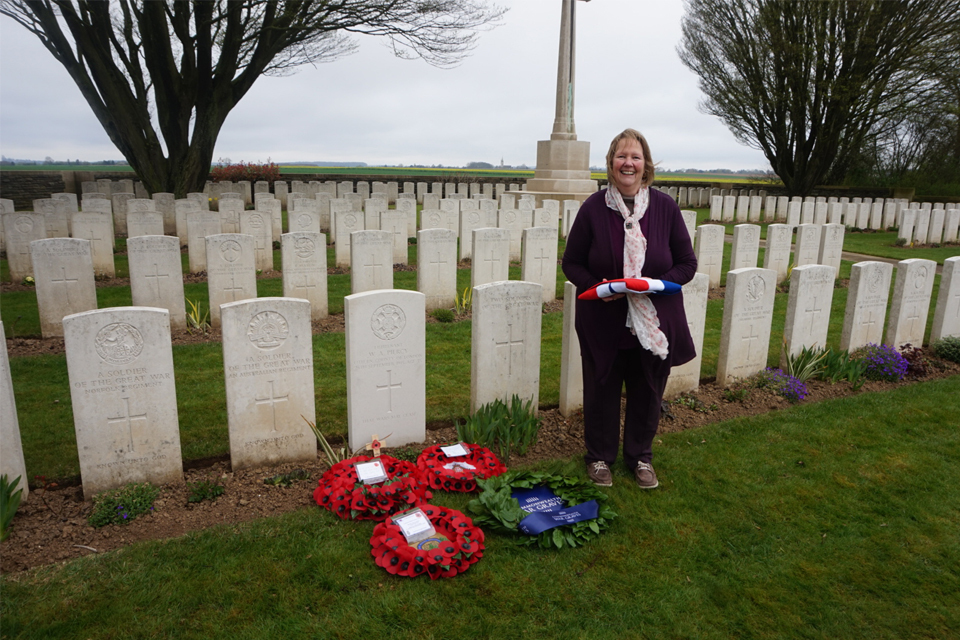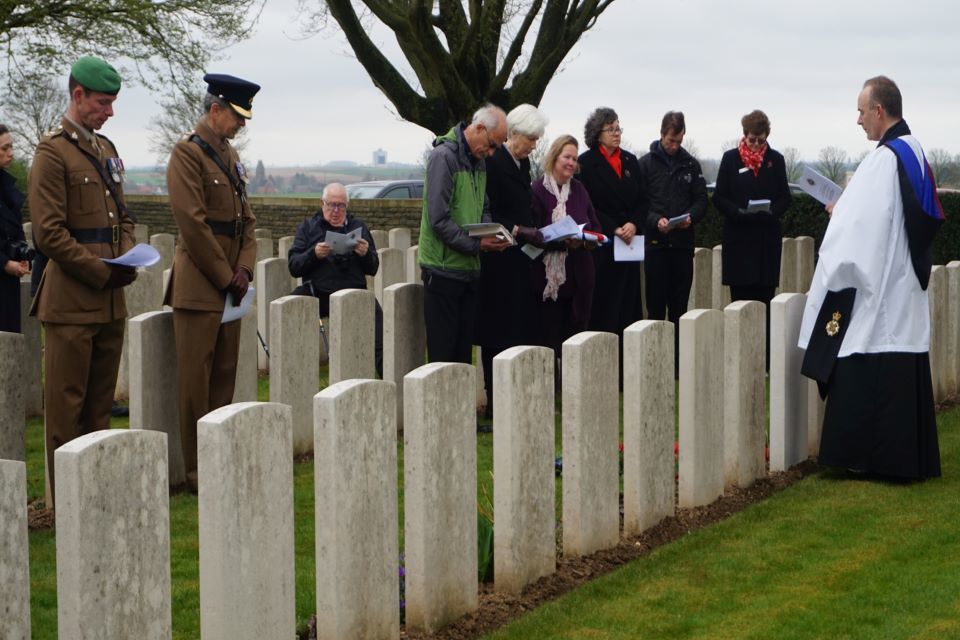Great War soldiers' graves rededicated in France
The graves of three London Regiment soldiers of World War 1 have been rededicated in France

Colonel Steven Lowe TD VR, Commanding Officer of The London Regiment, presents a Union Flag to Nancy Wright, great niece of Rfn Sleet.
On Tuesday 5 April and Wednesday 6 April, the graves of Rifleman (Rfn) Albert George Sleet, Lieutenant (Lt) Wilfrid Ashton Piercy and Serjeant (Sjt) James Gration DCM, who died during the Great War whilst serving with battalions of The London Regiment, were rededicated after more than a hundred years.
The services, which were organised by the MOD’s Joint Casualty and Compassionate Centre (JCCC), also known as the ‘MOD War Detectives’, were held at the Commonwealth War Graves Commission’s (CWGC) Arras Road Cemetery, Dud Corner Cemetery and Lebucquiere Communal Cemetery Extension respectively, all in the Pas-de-Calais region of France.
The graves of all three men were identified after researchers submitted evidence suggesting that their graves had been located. After further research by CWGC, the National Army Museum and MOD JCCC, it was confirmed as part of MOD JCCC’s adjudication that these men had in fact been found.
Rosie Barron, from MOD JCCC, said:
“It has been a privilege to work with The London Regiment to organise these rededication services and to meet the families of these men. Rfn Sleet, Lt Piercy and Sjt Gration all paid the ultimate sacrifice in the pursuit of our freedom and it is vital that their sacrifice is not forgotten.’”
Rfn Sleet was killed in at Hulluch, north of Loos-en-Gohelle, on 15 October 1915 aged 30. He was commemorated on the Loos Memorial which surrounds Dud Corner Cemetery. His family who attended the rededication service, had previously visited the memorial to pay their respects unaware that he was buried as an unknown soldier in the same cemetery.

The rededication service at Dud Corner Cemetery was attended by multiple generations of the Sleet family.
Rfn Sleet’s great niece, Nancy Wright, who attended the service with her family, said:
“Albert Sleet was killed before he married or had a family of his own. As grandchildren and great grandchildren of Albert’s brothers and sisters, who loved him dearly and who always remembered him, we are honoured to be representing his family.
“We wish to thank all those whose dedication and hard work enabled his final resting place to be identified and who have organised a such a fitting rededication service for him. It is a great comfort for us to know that he was never missing, but buried beside his comrades all along. May they all rest in peace.”
Lt Piercy was killed aged 35, near Loos-en-Gohelle on 26 September 1915, the second day of the Battle of Loos. He was commemorated on the Loos Memorial. The rededication service at Arras Road Cemetery was attended by members of his family.

Angela Ridge, the great great niece of Lt Piercy, stands at his graveside.
Angela Ridge, a great great niece of Lt Piercy, said:
“We’re proud to be able to represent Wilfrid’s immediate family and are immensely grateful to those who did the research and enabled the rededication service to take place.”

The Reverend Richard Terrado-Reardon CF, Chaplain to The London Regiment, leads the rededication service for Lt Piercy.
Sjt Gration was killed on 24 March 1918, shortly after the beginning of the German Spring Offensive as British forces were overwhelmed and in retreat. Sjt Gration was recorded as missing and commemorated on the Arras Memorial.
Following his death, Sjt Gration was awarded the Distinguished Conduct Medal. The citation published in the London Gazette of 21 October 1918 stated:
‘For conspicuous gallantry and devotion to duty during an attack. When his officer had become a casualty, he led his platoon with great courage and determination, reaching his objective and personally killing three of the enemy. During the whole time he set a fine example to his men.’
The services were attended by serving soldiers of The London Regiment and The Rifles, and were conducted by the Reverend Richard Terrado-Reardon CF Chaplain to The London Regiment.
The Reverend Reardon said:
“In being asked to officiate at these rededication services for Rfn Sleet, Lt Percy and Sjt Gration, these men were family members of the London regiment. This reintegration into the family of the London regiment draws us evermore close to the sacrifice of all those who lost their life in World War One, and in doing so we enrich not only our sense of heritage, but our own identity as we recognise our shared values that inspired these men to serve.
“We cannot bring them home, but we can provide a home as we rededicate not only their lives but our own commitment to them and those personnel serving this day.”
The headstones over their graves will now be replaced by the CWGC, who will care for their final resting places in perpetuity.
Commemorations Case Manager at the CWGC, Mel Donnelly, said:
“The Commonwealth War Graves Commission ensures all those who served and fell are commemorated by name. It truly is a privilege to be able to mark the graves of these three brave men with headstones bearing their names, more than 100 years after they died in the First World War. We will care for their graves in perpetuity.”